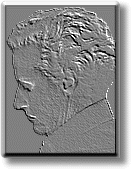
On James Tiptree, Alice Sheldon and bake sales
By Karen Joy Fowler
Contributing Writer

A number of women writing science fiction chose pen names that masked their sex -- C.L. Moore and Andre Norton are two early examples -- but I'm aware of only one female writer who was actually widely believed to be male. During the period of this masquerade, the reclusive Alice Sheldon published, under the name James Tiptree Jr., some of the most powerful stories the science fiction field will ever see and convinced most of her readers that this radical feminist work had been done by a man.
Interestingly, with the exception of her name, Sheldon never lied about the details of her biography. She was the daughter of a family of famous explorers, spending much of her childhood in Africa and India. She served in Air Force intelligence during World War II and worked for the CIA afterward. In the fifties she earned a Ph.D. in psychology. This life history went a long way toward convincing her readers she must be a man. Eventually she felt the need of a female pen-name as well, and some of her work can be found under the name Raccoona Sheldon. However, the bulk of Sheldon's science fiction work was published under the Tiptree pseudonym from 1967 until her identity was exposed in 1977. She and her husband died in 1987.
Today, the James Tiptree Jr. Memorial Award is presented annually to a short story or novel that explores or expands our understanding of gender. It was created by Pat Murphy and myself in 1991 both to honor Alice Sheldon and to remind the field of its own importance in the continual struggle to re-imagine more liveable sexual roles for ourselves. Just ask yourself, if we weren't taught to be women, what would we be? (Ask yourself this question even if you're a man, and don't cheat by changing the words.)
The award honors writers who try to answer that question -- writers who try to help us unlearn what television and the movies and books and comics and advertisements for automobiles and cigarettes have taught us about our sexual identities. Writers who try, like Alice Sheldon, to helpfully confuse us. The aim is not to look for work that falls into some narrow definition of political correctness, but rather to seek out work that is thought-provoking, imaginative, perhaps infuriating.
The winners so far have been:
1991 -- (co-winners) Eleanor Arnason for A Woman of the Iron People and Gwyneth Jones for White Queen.
1992 -- Maureen McHugh for China Mountain Zhang.
1993 -- Nicola Griffith for Ammonite.
1994 -- (co-winners) Ursula K. Le Guin for "The Matter of the Seggri" and Nancy Springer for Larque on the Wing.
1995 -- (co-winners) Theodore Roszak for The Memoirs of Elizabeth Frankenstein and Elizabeth Hand for Waking the Moon.
As a political statement, as a means of involving people, as an excuse to eat cookies and as an attempt to strike the proper ironic note, the Tiptree Award has been financed primarily through bake sales. Over the last five years bake sales have been held at science fiction conventions across the United States and also in England, Australia and Canada. Fund-raising efforts have also included the publication of two cookbooks, T-shirts silk-screened by San Francisco artist Freddie Baer and the Tiptree Quilt Project, a collaborative creation of a king-sized quilt by 75 people of all genders, ages and levels of sewing experience.
Recommendations for books published in 1996 can be e-mailed to tiptree-l@netcom.com.
ack to In the News
Copyright 1996, Science Fiction Weekly. Maintained by 70334.2433@compuserve.com